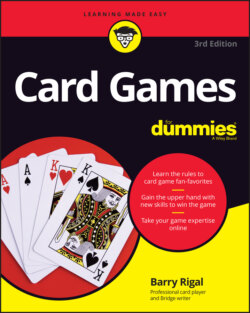Читать книгу Card Games For Dummies - Barry Rigal - Страница 28
Selecting the Best Card Game
ОглавлениеAll the card games in this book are excellent, of course — I provide only the cream of the crop. However, depending on the number of players and your collective experience and expectations, some games are more suitable than others. Depending on your needs, the following lists recommend certain games for various situations.
As a general point, though, the best card game to play is probably the one that some of your players already know. You pick up strategies of the game, as well as its customs and traditions, much faster by playing with experienced players rather than in a group consisting entirely of beginners.
If you have a specific number of players:
Solitaire games: Accordion and Poker Patience if you’re short on space; La Belle Lucie if you can spread yourself out. (See Chapter 2 for Solitaire games.)
Two-player games: Gin Rummy (Chapter 4), Spite and Malice (Chapter 2), and Cribbage (Chapter 16).
Three-player games: Pinochle (Chapter 14) and Ninety-Nine (Chapter 9).
Four-player games: Bridge (Chapter 12), Euchre (Chapter 10), Hearts (Chapter 13), and Spades (Chapter 11).
Five- to eight-player games: Hearts (Chapter 13) and Oh Hell! (Chapter 9).
Eight or greater player games: Eights (Chapter 6) and President (Chapter 17).
If you’re picking the game based on time constraints:
You can play Setback (Chapter 15), Whist (Chapter 8), and Euchre (Chapter 10) to specified target scores, which you can adapt to reflect the time you have available.
You can play Ninety-Nine (Chapter 9) for a specified number of hands.
If you have a few years at your disposal, I recommend an ongoing battle of Spite and Malice (Chapter 2).
If you’re selecting your game based on the type of play:
Serious, competitive types tend to enjoy Whist (Chapter 8) and Bridge (Chapter 12).
If you’re playing in a cramped space (on a plane, train, or bus), Hearts (Chapter 13) and Eights (Chapter 6) work well.
In a bar, Cribbage (Chapter 16) goes well with alcohol.
For large groups in a social setting, Poker (Part 6) and Blackjack (Chapter 18) are ideal.
For games that combine bidding and play, Pinochle (Chapter 14) and Spades (Chapter 11) are good choices.
The best partnership games are Bridge (Chapter 12), Whist (Chapter 8), and Euchre (Chapter 10).
If your deck of cards is defective, you want to play a game that doesn’t deal out all the cards. You can play Oh Hell! (Chapter 9), Spite and Malice (Chapter 2), and Setback (Chapter 15) with a deck that has missing cards.
If you’re selecting the game based on the experience level of the players:
For beginners: Oh Hell! and Ninety-Nine (both in Chapter 9) have simple, easy-to-understand principles.
For children: Go Fish and Cheat (both in Chapter 3) are simple, but they require younger players to think in order to win. Whist (Chapter 8) is the best introduction to trick-taking games for children.
For groups with mixed experience levels: Whist (Chapter 8) and Fan Tan (Chapter 7) rely heavily on luck, which gives everyone a sporting chance. Rummy (Chapter 4) also comes easily to inexperienced card players.
For experienced card players: Pinochle (Chapter 14) and Cribbage (Chapter 16) offer new thrills and challenges.
